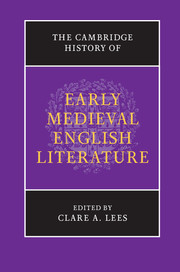Book contents
- Frontmatter
- Contents
- List of Illustrations
- List of Contributors
- Acknowledgements
- List of Abbreviations
- Introduction: literature in Britain and Ireland to 1150
- I WORD, SCRIPT AND IMAGE
- II EARLY ENGLISH LITERATURE
- III LATIN LEARNING AND THE LITERARY VERNACULARS
- 19 In measure, and number, and weight: writing science
- 20 Legal documentation and the practice of English law
- 21 Latinities, 893–1143
- 22 The authority of English, 900–1150
- 23 Crossing the language divide: Anglo-Scandinavian language and literature
- 24 European literature and eleventh-century England
- 25 Gaelic literature in Ireland and Scotland, 900–1150
- 26 Writing in Welsh to 1150: (re)creating the past, shaping the future
- Bibliography
- Index of manuscripts
- Index
20 - Legal documentation and the practice of English law
from III - LATIN LEARNING AND THE LITERARY VERNACULARS
Published online by Cambridge University Press: 05 February 2013
- Frontmatter
- Contents
- List of Illustrations
- List of Contributors
- Acknowledgements
- List of Abbreviations
- Introduction: literature in Britain and Ireland to 1150
- I WORD, SCRIPT AND IMAGE
- II EARLY ENGLISH LITERATURE
- III LATIN LEARNING AND THE LITERARY VERNACULARS
- 19 In measure, and number, and weight: writing science
- 20 Legal documentation and the practice of English law
- 21 Latinities, 893–1143
- 22 The authority of English, 900–1150
- 23 Crossing the language divide: Anglo-Scandinavian language and literature
- 24 European literature and eleventh-century England
- 25 Gaelic literature in Ireland and Scotland, 900–1150
- 26 Writing in Welsh to 1150: (re)creating the past, shaping the future
- Bibliography
- Index of manuscripts
- Index
Summary
The historical study of early English documents which could be subsumed under the rubric of ‘legal texts’ has seen an impressive resurgence in the past half-century, with the publication of Patrick Wormald’s The Making of English Law and editions of cartularies belonging to individual religious establishments. This chapter, by contrast, concentrates on the development of written and literary styles in legal documentation, examining how legal writing influenced and was influenced by other written texts. It also addresses the continued use of orality in legal transactions. The transition from oral to written transmission of laws and legal documents involved the development of legal formulations both drawing on oral tradition and also influenced by emergent literary styles. The following analyses present varieties of legal documentation – laws, charters (or diplomas), writs and wills – in chronological appearance, and consider how the cross-pollination between these genres and other forms of written culture both within and outside the Anglo-Saxon territories enhances our understanding of the uses of documentation in Anglo-Saxon England. Not only does the study of literature inform our interpretation of law, but legal formulations also leave traces on other facets of literary culture. The chapter ends with discussion of two cases showing law in practice, demonstrating the application of various forms of oral and written evidence.
- Type
- Chapter
- Information
- The Cambridge History of Early Medieval English Literature , pp. 499 - 529Publisher: Cambridge University PressPrint publication year: 2012

